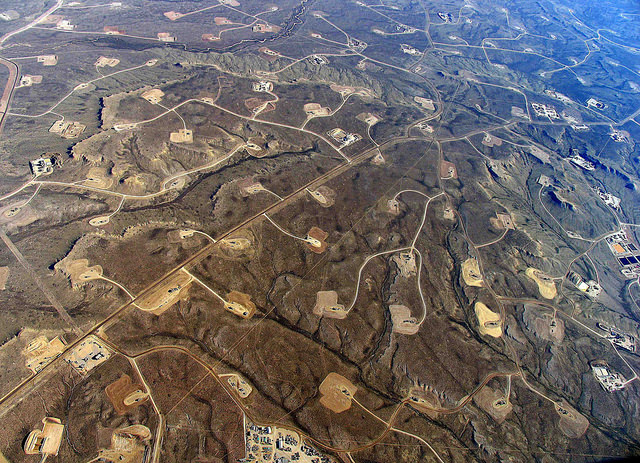Podcast: Play in new window | Download
Subscribe: RSS

No, this is not a Dallas suburb, it’s a fracking field. If you don’t like it now, imagine it in a few years, when it has been abandoned. (Photo by Simon Fraser University)
Recent research suggests that fracking causes earthquakes; they have no doubt of that at the fourth largest trading and investment company in Japan — Sumitomo Corporation — which has just experienced a Magnitude 10. The profit Sumitomo expected to make this year, a hefty $2.27 billion, has been all but wiped out. News of the disaster atomized 13 per cent of its stock value in one day. Its credit rating went to “negative.” And almost all of this was caused by hideous losses incurred in fracking for tight oil in Texas.
Sumitomo samurai rolled into Texas just two years ago (seems like only yesterday) with a $2 billion dollar investment in the Permian shale-oil play, in partnership with Devon Energy of Oklahoma. So here we have Japan’s fourth-largest trading company, along with one of the largest US fracking companies, going into the (potentially, according to the oil interests) richest tight-oil basin in the United States in the midst of a tight oil boom. What could possibly go wrong?
Sumitomo has no idea. They have appointed a committee to try to figure it out. “It is difficult,” said a dazed-sounding statement from the top, “to extract the oil and gas efficiently.” They could not, as it turned out, expect enough production “to recover the investment.” Wow. Not much of a business plan there.
What Sumitomo missed, as its investigating committee may or may not figure out, is that fracked wells are not at all like normal oil wells: they are twice as expensive to set up, many times more expensive to operate, and run out 10-20 times faster. The simple fact is that the wells are not paying for themselves. They look like they are going to, in their first year, but by the third or fourth year it’s clear that they are not going to. (For a devastating explanation of this point by the former head of research for a London money broker, see “Shale Gas: The Dotcom Bubble of Our Times.”)
Sumitomo is not alone in its mystification. Itochu Corporation, Japan’s third largest trading company, has written off 80 percent of a nearly $80 million investment in a US fracking company. And then there is Shell, which took a $2 billion hit last August as punishment for its shale-oil and -gas enthusiasm, and this year bailed out of a business in which it had been one of the largest players.
Every Ponzi scheme and bubble is based on the Greater Fool hypothesis of investing, which is that the real value of the assets you’re buying don’t matter as long as you can find a greater fool, someone who knows even less about the assets than you do, who will buy them from you. When you run out of fools, the market crashes.
With Sumitomo bailing now — that is, selling its leases — the search for the next greater fools is becoming really intense. They are going to experience peak fools very soon. And then there is going to be an earthquake we will all feel.
“They are going to experience peak fools very soon. And then there is going to be an earthquake we will all feel.”
You, sir, have nailed it! Isn’t it comforting to realize that the very existence of almost every living thing on this planet rests in the “hands” and, ahem, minds of “fools,” aka useful idiots.
Who’s the more foolish, the fool or the fool who follows him? – Obi-Wan Kenobi
“Peak fools.” Pitch perfect.
And then there is BLM, who commissioned a report for California reauthorizing oil and gas leases, citing that they “found no evidence for water contamination.” Even though they looked for none.
http://www.latimes.com/local/la-me-fracking-report-20140829-story.html
“For example, the report found no evidence of water contamination from fracking in California, but the scientist directing the research, Jane Long, said researchers also had no data on the quality of water near fracking sites.
“We can only tell you what the data we could get says,” said Long, a former director at Lawrence Livermore National Laboratory. “We can’t tell you what we don’t know.”
So here come more fracking leases in a state suffering an epochal drought and on top of an earthquake zone. What could possibly go wrong?
Peak fools, indeed.
yes, Peak Fools, that made me laugh this morning! sometimes just the perfect phrase comes along that sums things up perfectly and I think you’ve done it!
thanks for the great article and the laugh this morning. :D